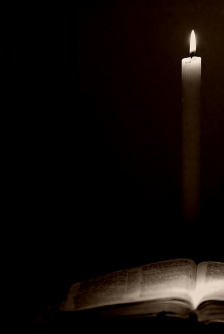April 28, 2024: Fifth Sunday of Easter
John 15:1-8
Jesus said to his disciples, “I am the true vine, and my Father is the vinegrower. He removes every branch in me that bears no fruit. Every branch that bears fruit he prunes to make it bear more fruit. You have already been cleansed by the word that I have spoken to you. Abide in me as I abide in you. Just as the branch cannot bear fruit by itself unless it abides in the vine, neither can you unless you abide in me. I am the vine, you are the branches. Those who abide in me and I in them bear much fruit, because apart from me you can do nothing. Whoever does not abide in me is thrown away like a branch and withers; such branches are gathered, thrown into the fire, and burned. If you abide in me, and my words abide in you, ask for whatever you wish, and it will be done for you. My Father is glorified by this, that you bear much fruit and become my disciples.”
One day years ago I was having a conversation with my youngest son about his Grandma’s death. She was my husband’s mom and had died about a year before of a brain aneurysm. As we commiserated together on the sadness of losing Grandma and the physical devastation her body had experienced, my son looked up at me and said quietly, “But she’ll be made whole again, Mom, when God starts the earth all over again and everything is made new.” My son was four years old when we had this conversation.
Children have an innate knowledge and experience of God’s indwelling presence that we adults sometimes lack. And they haven’t forgotten yet, unless they’ve been made to forget by abuse or neglect, that they are created in God’s image and they are special. But we adults, we’ve taken on so many layers by the time we reach adulthoold, layers of guilt, layers of busyness and worry, layers of estrangement from ourselves and others, that we forget this indwelling presence. We have to come back to ourselves, back to the God who has loved us from the beginning.
In order to help us along on our journey back to God, Jesus tells us in today’s gospel reading today to abide in him. He uses the imagery of branches growing from a vine to show just how closely we are connected to him, as connected as branches are to their source, the vine. Jesus also tells us how important it is to maintain this connection, that if we are to live and love and flourish, we have to draw our strength from him who is the source of our lives. We don’t have to go anywhere to find God, God is right here with us, God’s love is the creative force that dwells within each one of us.
Many of us, however, have realized that we have lost touch with the God who loves us, and so what do we do? In our frantic efforts to find God, in our recognition of our own incredible need for God’s love and God’s healing, we hope that we will find God out there someplace because we’ve added so many layers of untruth to the reality of just who we really are: beloved daughters and sons of God. And so off we go, in search of God’s love. We think that if we read the right book or go to the right church or associate with a certain group of people, we will find God. And oftentimes, we’re disappointed. The institutions or the churches or the groups where we thought we’d find God are many times a poor substitute for the real thing.
But this God of infinite love, this God who reminds us of God’s presence no matter where we are, this One who desires to be connected to us, beckons us today to look in the one place where we are sure to find God: ourselves. Macrina Weiderkehr talked about our journey back to ourselves and thus back to God in her poem, Tourist or Pilgrim. She asks the question, “Where is home? Oh, where is the place where beauty will last?” She laments her weariness in seeking treasures that tarnish and how heavy her luggage is, until the truth within her says, “There is a road that runs straight through to your heart. Walk on it.” Dorothy in the Wizard of Oz seemed to uncover this same truth when she learned that to find her heart’s desire, she didn’t need to look any further than her own backyard. And after years of restless wandering, Thomas Merton sought out a Trappist monastery in an attempt to find God for whom he longed, only to realize the God who loved him was with him all along.
But isn’t it hard to do to recapture the innocence of childhood we might have had before we learned to forget our inner beauty, the Treasure that lies within each one of us? Isn’t it hard to reclaim the dignity that belongs to each of us, a dignity that is there because God the source of all life dwells within us?
And so Jesus tells us today to abide in him. Perhaps when we abide in Jesus, when we stay connected to Jesus, we remember who we really are: people who are precious in God’s sight. By remembering that God’s love and God’s life dwells within each of us, we can come home to ourselves, and thus we can come home to God. We don’t have to go anywhere to find the God who loves us, we just have to look within our hearts to find the God who was there all along. And so, in the words of T.S. Eliot, “the end of all our exploring will be to arrive where we started, and know the place for the first time.”
